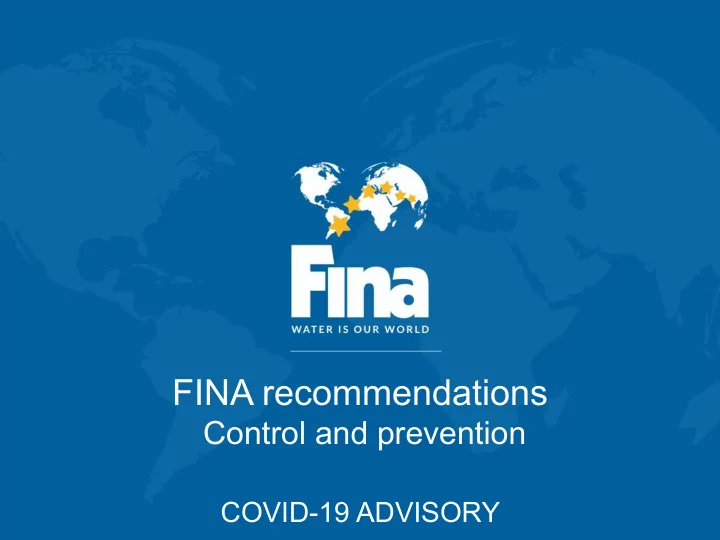

FINA recommendations Control and prevention COVID-19 ADVISORY
How can you protect yourself ? 1. Hand hygiene (Clean your hands regularly, especially when you go in and out of places like your home, your room in the residence, your place of work, the gym, etc. See slide below “ How to Handrub ” by WHO) 1. Maintain social distancing (1m) 1. Avoid touching face 1. Greet people with a wave, a nod, or a bow 2. Practice respiratory hygiene 3. Avoid unessential travel and large social gatherings 1. Monitor your health and stay home if ill
How to protect yourself when you train? • If you do physical maintenance exercise, avoid physical contact with your peers • Do not drink from the same bottle as others • Try not to exercise too close to your colleagues (at least keep a distance of 1 meter). It is not recommended to train with larger groups than 3-4 people • Cover your mouth and nose with a tissue when you cough or sneeze, never by hand • If you are going to handle materials such as technical equipment (stick, racket, snorkel, glasses, helmets, etc) clean it with alcohol before and after use • Avoid using gym equipment if you do not know if it has been disinfected beforehand • After exercising, try to clean your clothes and any material you can in hot water for about 60-90 C° with ordinary detergent. Training material that cannot be cleaned with alcohol
What is the corona virus? What are the symptoms of COVID-19 ? • Coronaviruses are a large family of viruses which may cause respiratory illness in humans. • Most common symptoms are fever, tiredness, and dry cough. • This new virus and disease began in • Some patients may have aches and pains, Wuhan, China, in December 2019. nasal congestion, runny nose, sore throat or diarrhea. • Coronavirus causes an illness called COVID-19. • Most people (about 80%) recover from the disease without treatment. • Older people or those with underlying health problems can develop difficulty breathing requiring medical attention.
Nutrition advices • If you're going to train less, try to regulate your caloric intake. The less energy you require, the less you will need. You can control your weight every 5 days without obsessing • If you stay at home, avoid having processed foods (chocolate, sausages, pastries, butter, etc.) • Take the opportunity to spend time on "healthy cooking". Take time to eat and cook vegetables • Increase the intake of foods that stimulate your immune system. Vitamins A, C and E act as antioxidants to protect and strengthen your system: pumpkin, carrot, radish, cabbage, cauliflower, broccoli, red fruits, oranges, tangerines, etc. • Maintain protein intake through eggs and dairy • Drink more than usual. You can set a goal to drink those 2.5-3 litters a day that are recommended
Sleep advices • Try to take the opportunity to regain some sleep. Sleep between 7 and 9 hours a day would be ideal • Avoid changing your usual sleep schedule. If your workouts are early, you should continue with the schedule, so you don't have trouble getting back into the habit • Ventilate and clean your room or sleeping space every day. Wash your bed sheets in hot water (60C°) every 5 days
Mindset advices • Asking ourselves what is up to us, can we do anything? And if the answer is positive, focus on what we can do. If we devote energy and attention to things where we cannot act, which do not depend on us, or where we cannot influence, we are losing our energy and our anxiety grows • Observing the situation from a distance (either by imagining that we are flying over the situation, as if we were an eagle, or by thinking what will bother us in 10 years time) • Avoid over-information. Being permanently connected will not make you better informed. • Contrast the information you share on social networks. Before sending anything make sure it comes from official sources (Ministry of Health, Health Professional Associations, Official Bodies, WHO, etc) • Keep a positive attitude about your situation for future sports events. We don't know what will happen, but we do know that we can work to be prepared. • And above all, be careful with rejection behaviour. Fear can cause us to behave in impulsive ways, rejecting or discriminating against certain partners
Schedule and organization advices Here are some guidelines and mental training exercises that might help you... • Set a schedule • Differentiate activities at home from Monday to Friday and on weekends • Do Skype, Face time or WhasApp videos with your family, friends, coaches, colleagues... • Take this "stay at home" as an opportunity to grow on an emotional and personal level, let's get to it! • You're an athlete , you're used to challenges and adapting to new situations.
How are you going to organize ? Here is an example of how you can organize your week by days and activities Start to create yours !
Stay informed COVID-19 website: https://www.who.int/health- topics/coronavirus WHO Travel Advice: https://www.who.int/ith/en/
Recommend
More recommend